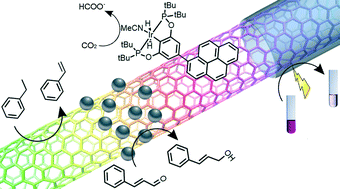Carbon nanotubes and catalysis: the many facets of a successful marriage
Abstract
Carbon nanotubes have emerged as unique carbon allotropes that bear very interesting prospects in catalysis. Their use is mostly related to that of supports for inorganic metal catalysts, including molecular catalysts, metal nanoparticles, metal oxides or even more complex hierarchical hybrids. However, several reports have shown that they can intriguingly act as metal-free catalysts, with performance often superior to that of other carbon materials, in particular when ad hoc organic functional groups are attached prior to catalytic screening. The range of catalytic reactions is quite wide, and it includes standard organic synthesis, electrocatalysis, photocatalysis as well as other important industrial processes. In the last few years, the energy sector has acquired a dominant role as one of the most sought-after fields of application, given its ever-increasing importance in society.


 Please wait while we load your content...
Please wait while we load your content...